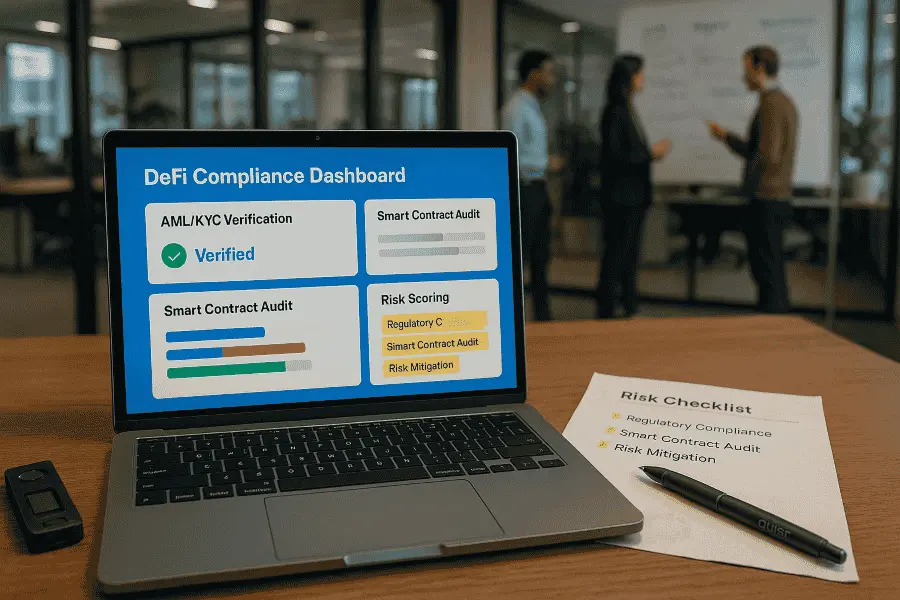Raising capital through token sales is a powerful tool for blockchain startups, but it comes with complex securities regulations. Understanding how the Simple Agreement for Future Tokens (SAFT), Regulation D (Reg D), and Regulation Crowdfunding (Reg CF) apply is essential for founders to structure compliant offerings that attract investors while minimizing legal risks.
This article breaks down these frameworks, their differences, and practical guidance to help you navigate token sale compliance effectively.
What Is a SAFT and How Does It Fit Into Token Sales?
The Simple Agreement for Future Tokens (SAFT) is a contractual framework that allows blockchain startups to raise capital by selling rights to future tokens before the network launches. It’s designed to comply with securities laws by treating the agreement as a security offering, deferring token delivery until the protocol is functional.
- Why use a SAFT?
SAFTs provide legal clarity by ensuring the initial sale complies with securities regulations, often under exemptions like Reg D. This approach was pioneered by projects like Filecoin, which raised over $200 million through a SAFT under Rule 506(c) of Reg D. - How does it work?
Investors purchase rights to tokens, with delivery contingent on network launch. This defers regulatory questions about whether the token itself is a security. - Key considerations:
SAFTs must be structured carefully to avoid triggering securities registration for the tokens themselves. Founders should provide transparent disclosures, including token economics, vesting schedules, and risk factors.
Regulation D (Reg D) – The Workhorse of Private Token Sales
Reg D is the most popular exemption for blockchain projects conducting private token sales. It allows companies to raise unlimited capital from accredited investors without registering the offering with the SEC.
- Key rules under Reg D:
- Rule 506(b): No general solicitation allowed; up to 35 non-accredited investors permitted alongside unlimited accredited investors.
- Rule 506(c): General solicitation allowed, but sales only to accredited investors who are verified through “reasonable steps.”
- Benefits for blockchain startups:
Reg D offers a streamlined, private fundraising path that avoids the expense and delay of full SEC registration. It supports flexible structures like SAFTs and allows public marketing under Rule 506(c), which many crypto projects leverage to expand reach while maintaining compliance. - Popular platforms:
Many blockchain startups use Reg D portals like AngelList and FundersClub to manage investor onboarding and verification. - Case example:
Filecoin’s $200 million raise under Rule 506(c) combined public marketing with strict accredited investor verification, illustrating how Reg D can support large-scale token sales.
Regulation Crowdfunding (Reg CF) – Democratizing Token Sales
Reg CF allows startups to raise up to $5 million annually from both accredited and non-accredited investors through SEC-registered crowdfunding portals.
- Key features:
- Offers are made via registered intermediaries (broker-dealers or funding portals).
- Enables community participation, expanding your investor base beyond traditional VCs.
- Requires financial disclosures and ongoing reporting to the SEC.
- Why consider Reg CF?
It’s ideal for early-stage projects seeking community engagement and smaller capital raises. It also supports the use of SAFEs (Simple Agreements for Future Equity), which have become popular for their simplicity and flexibility in Reg CF offerings. - Limitations:
The $5 million cap and regulatory requirements mean Reg CF is less suitable for large raises or projects seeking institutional capital. - Platforms:
The number of Reg CF crowdfunding platforms has grown rapidly in 2025, with many focusing on blockchain and tech startups.
Your exploration naturally connects with insights from blockchain startup fundraising strategies that frame broader market trends in blockchain financing.
Comparing Reg D and Reg CF for Token Sales
| Aspect | Reg D | Reg CF |
|---|---|---|
| Capital Raised | Unlimited | Up to $5 million per 12 months |
| Investor Types | Accredited investors primarily; limited non-accredited under 506(b) | Both accredited and non-accredited investors |
| General Solicitation | Allowed under 506(c) only | Allowed |
| Intermediaries | Not required | Must use SEC-registered portals |
| Reporting Requirements | Less stringent, no ongoing reporting | Annual reports and disclosures required |
| Use Case | Large private raises, institutional focus | Early-stage, community-driven fundraising |
For blockchain startups, Reg D is often preferred for large, private sales, while Reg CF suits community-focused, smaller raises.
Navigating Compliance Challenges in Token Sales
AML/KYC Requirements
Both Reg D and Reg CF offerings require robust AML (Anti-Money Laundering) and KYC (Know Your Customer) processes to verify investor identities and prevent illicit activities. These are critical to winning investor confidence and regulatory approval.
- Best practices:
Use reputable third-party providers for identity verification. Maintain detailed records for audits and reporting. See blockchain AML KYC investors for comprehensive guidance.
Disclosure and Risk Management
Transparency is non-negotiable. Your offering documents must clearly disclose:
- Token economics and supply schedules
- Team and advisor allocations with vesting
- Technical and regulatory risks
- Use of proceeds and development roadmap
Proper risk disclosure protects you legally and builds investor trust.
Proof of Reserves and Audit Standards
Increasingly, investors demand proof of reserves and independent audits to verify token backing and treasury health. Establishing these standards can differentiate your offering.
Strategic Stacking: Combining Reg D, Reg CF, and SAFTs
Some blockchain projects maximize fundraising potential by strategically combining these frameworks:
- Use Reg D for accredited investors and large seed rounds.
- Leverage Reg CF to engage your community and raise smaller amounts.
- Employ SAFTs to structure token delivery post-network launch.
This hybrid approach allows you to tap multiple investor segments while staying compliant.
Conclusion
Navigating securities laws for token sales is complex but essential for blockchain founders seeking sustainable capital. Understanding the nuances of SAFTs, Reg D, and Reg CF empowers you to design compliant, scalable fundraising strategies. Prioritize transparency, investor protection, and regulatory compliance to build trust and attract capital. Leveraging the right combination of exemptions and agreements will position your project for long-term success.
If you’re looking to align token design with legal, tax, and governance realities, at Qubit we understand emissions, lockups, and jurisdictional nuance. Build credibility via our blockchain fundraising assistance services.
Key Takeaways
- SAFTs provide a compliant framework for selling rights to future tokens, deferring token delivery until network launch.
- Reg D enables unlimited fundraising from accredited investors, making it ideal for large, private token sales.
- Reg CF democratizes fundraising, allowing up to $5 million from both accredited and non-accredited investors via SEC-registered portals.
- Robust AML/KYC, transparent disclosures, and proof of reserves are essential for legal compliance and investor trust.
- Combining SAFT, Reg D, and Reg CF strategically can maximize fundraising reach while maintaining regulatory compliance.
Frequently asked Questions
Can I publicly advertise my token sale under Reg D?
Yes, under Rule 506(c) you can use general solicitation, but only accredited investors may participate, and you must verify their status






